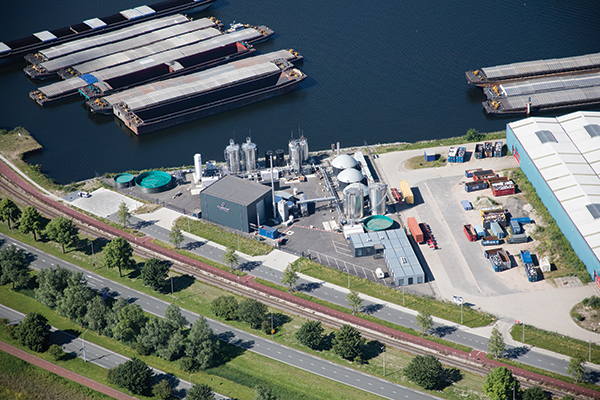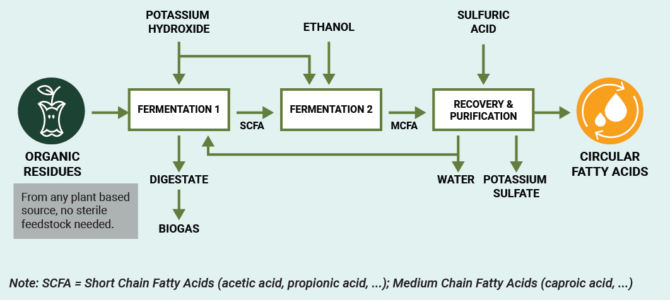
The Dutch chemicals startup ChainCraft has positioned itself as a company that operates in the biobased economy. Its products, masterminded at its demonstration plant in Amsterdam, are “safe and sustainable chemicals” used in several applications and industries, including lubricants.
What is meant by the term biobased economy?
“The biobased economy concerns the transition from an economy that depends on fossil raw materials into an economy using biomass as a raw material,” explained a Chaincraft official.
In the case of ChainCraft, this biomass can range from “sugar molasses” to “cabbage cores,” meaning any type of plant-based source primarily coming from food waste. The company employs traditional fermentation in producing its chemical products from this biomass.
“We are not producers of [synthetic] oil esters; however, we do enable more sustainable polyol ester production by providing more sustainable fatty acids,” Jeroen van Dorp, the company’s commercial manager, said at ACI’s European Base Oils and Lubricants conference held in Barcelona in November.
“ChainCraft’s unique and patented solution is based on a three-step process using non-GMO ‘mixed culture fermentation’ and downstream processing to create mixed medium-chain fatty acids and their fractionated pure products,” van Dorp said.
Fatty acids, in combination with alcohols, make widely used polyol esters. The lubricant industry’s use of esters has grown steadily for the past few decades as synthetic base stocks have become more popular.
Beyond Chemistry
In traditional chemistry, fatty acids come through chemical synthesis and can be made from petrochemicals or materials derived from plants or animals. Some of the more common plant sources are palm, rapeseed, canola and soybeans, most of which are also food sources.
While these sources are renewable, van Dorp emphasized that there is a significant environmental risk present when large-scale industries—including food, pharmaceutical, cosmetics or lubricants—use fatty acids derived from petrochemicals or plant sources.
“Our expertise is fermentation—more specifically, producing fatty acids from fruit and vegetable waste coming from the agrifood industry. Our process yields sustainable fatty acids that are palm and crude oil free due to our proprietary fermentation technology,” he said.

“First of all, petrochemicals cause greenhouse gas emissions and environmental devastations, while the use of palm oil results in biodiversity loss and climate impact,” he added.
In a sort of knock-on effect, van Dorp posited that deriving fatty acids from these sources has dire consequences and can even “violate human rights.”
The United Nations agrees. In fact, the organization has stated that climate change pushes beyond the bounds of environmental concerns and into the realm of human rights, as people living in many regions across the globe have been victims of increasingly frequent natural disasters caused by the changing climate, such as tornadoes, floods, hurricanes and wildfires.
“Climate change threatens the effective enjoyment of a range of human rights, including those to life, water and sanitation, food, health, housing, self-determination, culture and development,” said the UN’s Office of the High Commissioner for Human Rights. “States have a human rights obligation to prevent the foreseeable adverse effects of climate change and ensure that those affected by it, particularly those in vulnerable situations, have access to effective remedies and means of adaptation to enjoy lives of human dignity.”
Waste No More
ChainCraft sees a potential solution to the fight against climate change: the production of chemicals from waste. This endeavor is aligned with the global trends of the circular economy, sustainable development and the transition to renewable sources of energy, such as wind and solar.
At its climate change Conference of the Parties (COP28) in Dubai, the United Nations announced on December 13 that an agreement was made “that signals the beginning of the end of the fossil fuel era by laying the ground for a swift, just and equitable transition, underpinned by deep emissions cuts and scaled-up finance.”
In line with this, van Dorp said that now “is the right time to start product development for new polyol esters based on circular caproic acid, which is currently not widely available due to its scarcity in palm and coconut oil. Other fatty acid producers do not have the C6 grade availability as we do.”
Like hundreds of like-minded chemical companies, ChainCraft has aligned itself with the European Union’s “Fit for 55” plan for green transition. Fit for 55 aims to reach the EU’s goal of reducing emissions in the bloc by at least 55% by 2030.
ChainCraft stated that its products must be made in a biobased circular economy powered by renewable carbon. They should also be derived from local sources and have a stable supply from non-genetically modified food waste.
It considers itself as a supplier of sustainable fatty acids for the production of fully biobased polyol esters that could be eligible for the EU Ecolabel, the EU’s official voluntary symbol that shows that the products are part of the EU’s single market of green production.
“These new waste-based fatty acids bring three key benefits,” van Dorp said. “They are not only sustainable but have a three to six times lower carbon footprint. They are more stable in supply and price, and can provide functional improvements, such as high viscosity as well as high polarity and stability.”
Processes and Products
The non-GMO organic residues from any plant-based food sources are processed through mixed-culture fermentation, van Dorp explained. The process includes three steps.
In the first step, hydrolysis and acidification occur with the use of potassium hydroxide, resulting in short-chain fatty acids. These are then fermented in a second stage involving chain elongation and the use of ethanol, resulting in medium-chain fatty acids. Finally, the fatty acids are recovered and purified using sulfuric acid, with “circular” fatty acids as the final, marketable product. During this process, biogas, potassium sulfate and water are the byproducts.
ChainCraft’s products include four to eight grades of X-Craft-branded caproic, butyric, valeric, heptonic, and caprylic acids. The company says that it is “ready to enable production of fully biobased polyol esters eligible for an EU Ecolabel.”

The X-Craft product line “is developed for the chemical industry and is perfect for synthetic base oil production,” the company said. “Higher purity grades will be available upon request. In addition, a novel class of low-viscosity lubricants can be made from biobased caproic acid as an innovative new ingredient.”
ChainCraft indicated that these potential low-viscosity and energy-efficient specialty lubricants will have good thermal and oxidative stability. The finished lubricants might also boast a low carbon footprint and biodegradability.
Furthermore, “depending on the chain length, fatty acids bring different properties, making them ideal for numerous applications. ChainCraft aims to supply the following industries: lubricants, agriculture, food, flavoring and fragrances, feed, production of bio-alcohols, home and personal care, paints and coatings,” the company said.
Timing
“The mission of ChainCraft is an industry where all chemistry is circular,” van Dorp said. “This is ambitious and visionary, though we are happy that together with our partners we are making steps toward this goal each and every day.”
Using diverse state and European Union funding, ChainCraft opened a small demonstration facility located in the Port of Amsterdam. It has the capacity to produce 2,000 tons per year of fractionated, single-cut fatty acids using its proprietary fermentation process. The pilot plant can produce C4 to C8 grades of fatty acid salts.
Van Dorp added that the company is continuing to work on product development and appealed to investors to help the industry in this transition.
The company is actively exploring various venture capital funds, with the aim of scaling up its pilot production toward full scale. This includes the construction of a 30,000 t/y “ChainCraft flagship plant” to be located “in or around the Netherlands or Western Europe.”
Van Dorp mentioned that he cannot reveal the exact location because the company is working toward an agreement with partners. The plant is scheduled to launch its operation in 2026 “with a sustainable supply of fractionated, single-cut fatty acid products,” the company said.
Cutting Carbon
The company conducted a life cycle assessment simulation of its planned 30,000 t/y fatty acids plant project using potato juice resources. The simulation shows the impact the plant could have on global warming by its carbon footprint. According to ChainCraft’s calculations, the plant’s footprint is 0.85 kilograms of carbon dioxide per kilogram of product when potato juice is the feedstock.
Using other widely available vegetable sources, such as coconut or palm oil, that impact would be above 4 kg CO2/kg of product. With crude oil, the impact would be 2.35 kg CO2/kg of product.
Pricing Stability
Of course, it is no secret that synthetic base stocks can be much more expensive than their mineral oil counterparts. But ChainCraft has projected that the sustainability of its unique sources can improve the stability of fatty acid prices as well as supply. This is possible “because the waste is always available and is available at low price with minimal volatility,” the company said.
Van Dorp added that the company’s fatty acid pricing and availability depend on long supply chains. He explained that the traditional sources for fatty acid supply—such as coconut and palm kernel oils as well as crude oil—are typically challenged by price fluctuation and that the feedstock price volatility cannot be transferred to end-product prices.
Boris Kamchev is a staff writer with Lubes’n’Greases. Contact him at Boris@LubesnGreases.com